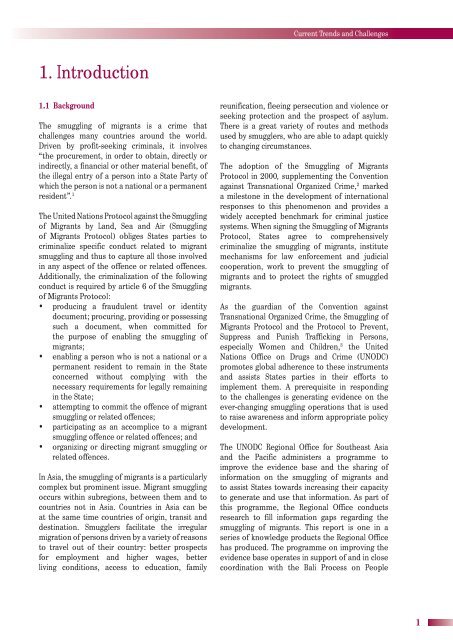Current_Trends_and_Related_Challenges_web
Current_Trends_and_Related_Challenges_web
Current_Trends_and_Related_Challenges_web
You also want an ePaper? Increase the reach of your titles
YUMPU automatically turns print PDFs into web optimized ePapers that Google loves.
<strong>Current</strong> <strong>Trends</strong> <strong>and</strong> <strong>Challenges</strong><br />
1. Introduction<br />
1.1 Background<br />
The smuggling of migrants is a crime that<br />
challenges many countries around the world.<br />
Driven by profit-seeking criminals, it involves<br />
“the procurement, in order to obtain, directly or<br />
indirectly, a financial or other material benefit, of<br />
the illegal entry of a person into a State Party of<br />
which the person is not a national or a permanent<br />
resident”. 1<br />
The United Nations Protocol against the Smuggling<br />
of Migrants by L<strong>and</strong>, Sea <strong>and</strong> Air (Smuggling<br />
of Migrants Protocol) obliges States parties to<br />
criminalize specific conduct related to migrant<br />
smuggling <strong>and</strong> thus to capture all those involved<br />
in any aspect of the offence or related offences.<br />
Additionally, the criminalization of the following<br />
conduct is required by article 6 of the Smuggling<br />
of Migrants Protocol:<br />
• producing a fraudulent travel or identity<br />
document; procuring, providing or possessing<br />
such a document, when committed for<br />
the purpose of enabling the smuggling of<br />
migrants;<br />
• enabling a person who is not a national or a<br />
permanent resident to remain in the State<br />
concerned without complying with the<br />
necessary requirements for legally remaining<br />
in the State;<br />
• attempting to commit the offence of migrant<br />
smuggling or related offences;<br />
• participating as an accomplice to a migrant<br />
smuggling offence or related offences; <strong>and</strong><br />
• organizing or directing migrant smuggling or<br />
related offences.<br />
In Asia, the smuggling of migrants is a particularly<br />
complex but prominent issue. Migrant smuggling<br />
occurs within subregions, between them <strong>and</strong> to<br />
countries not in Asia. Countries in Asia can be<br />
at the same time countries of origin, transit <strong>and</strong><br />
destination. Smugglers facilitate the irregular<br />
migration of persons driven by a variety of reasons<br />
to travel out of their country: better prospects<br />
for employment <strong>and</strong> higher wages, better<br />
living conditions, access to education, family<br />
reunification, fleeing persecution <strong>and</strong> violence or<br />
seeking protection <strong>and</strong> the prospect of asylum.<br />
There is a great variety of routes <strong>and</strong> methods<br />
used by smugglers, who are able to adapt quickly<br />
to changing circumstances.<br />
The adoption of the Smuggling of Migrants<br />
Protocol in 2000, supplementing the Convention<br />
against Transnational Organized Crime, 2 marked<br />
a milestone in the development of international<br />
responses to this phenomenon <strong>and</strong> provides a<br />
widely accepted benchmark for criminal justice<br />
systems. When signing the Smuggling of Migrants<br />
Protocol, States agree to comprehensively<br />
criminalize the smuggling of migrants, institute<br />
mechanisms for law enforcement <strong>and</strong> judicial<br />
cooperation, work to prevent the smuggling of<br />
migrants <strong>and</strong> to protect the rights of smuggled<br />
migrants.<br />
As the guardian of the Convention against<br />
Transnational Organized Crime, the Smuggling of<br />
Migrants Protocol <strong>and</strong> the Protocol to Prevent,<br />
Suppress <strong>and</strong> Punish Trafficking in Persons,<br />
especially Women <strong>and</strong> Children, 3 the United<br />
Nations Office on Drugs <strong>and</strong> Crime (UNODC)<br />
promotes global adherence to these instruments<br />
<strong>and</strong> assists States parties in their efforts to<br />
implement them. A prerequisite in responding<br />
to the challenges is generating evidence on the<br />
ever-changing smuggling operations that is used<br />
to raise awareness <strong>and</strong> inform appropriate policy<br />
development.<br />
The UNODC Regional Office for Southeast Asia<br />
<strong>and</strong> the Pacific administers a programme to<br />
improve the evidence base <strong>and</strong> the sharing of<br />
information on the smuggling of migrants <strong>and</strong><br />
to assist States towards increasing their capacity<br />
to generate <strong>and</strong> use that information. As part of<br />
this programme, the Regional Office conducts<br />
research to fill information gaps regarding the<br />
smuggling of migrants. This report is one in a<br />
series of knowledge products the Regional Office<br />
has produced. The programme on improving the<br />
evidence base operates in support of <strong>and</strong> in close<br />
coordination with the Bali Process on People<br />
1


